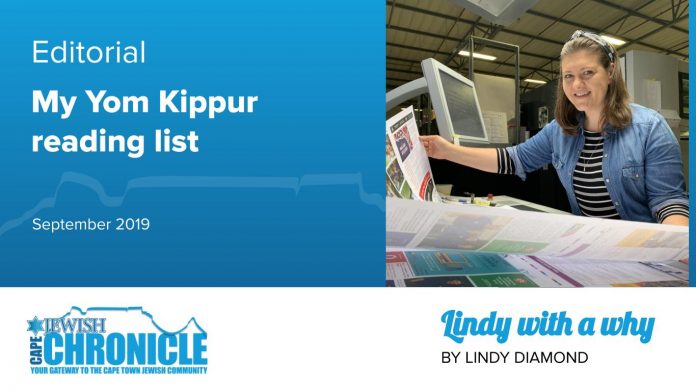I come to the Yom Kippur services with two books.
One is my machzor, the other is Elie Wiesel’s Night.
I read Night in one sitting on Yom Kippur. Allowing each word to burn into my heart with no respite. I don’t read it at any other time of the year and as those first pangs of an empty tummy hit me in the late morning, I read, “They called him Moshe the Beadle, as though he had never had a surname in his life.” And I know my task has started.
The copy of the book I read is my husband’s, come to the bookshelf as part of the merging of two lives. I have thought of buying a copy that is just mine, but this paperback student edition is special to me. I even went to Yad Vashem to see if a version from their bookshop would feel imbued with meaning and thus be able to replace the one that isn’t mine. But none of them felt right, they were all new and impersonal. Perhaps the very fact that I have to borrow this piece of my Yom Kippur tradition is exactly at it should be.
I come to the Yom Kippur services with my Jewishness represented in two ways; my religion in my machzor, which is heavily used on the day, don’t fret; and my cultural heritage wrapped up in Elie Wiesel’s testimony.
You would be forgiven for thinking I had lost family in the Holocaust. On the contrary, my great-great grandparents came here long before the first rumblings. I have battled to find any connection to individuals. And since I can’t pray for individuals, I pray for my ancestors’ entire communities. Just in case there is one person who needs me to remember.
When I was in Israel last year I came across Martef HaShoah, a small museum containing plaques memorialising over 2000 Jewish communities destroyed during the Holocaust. I asked the guide about the places my family had come from; Kovno and Kiev. For Kovno he could show me a plaque, as would be expected. But there was no plaque for Kiev, instead there was a black tombstone engraved with the words Babi Yar. I cried as I stood there. Is it not a second blow that the memorial for Kiev is not for the city where they lived, but the ravine where they died?
I come to the Yom Kippur services with a balance of where my people have come from, and where we want to go. Every year I give my children books, this year they are each getting The Children of Willesden Lane, by the talented pianist and author Mona Golabek. One day in the future, they will get their own copies of Night.
But it’s not all doom and gloom. While I spend part of Yom Kippur in earnest reflection of the tremendous loss of the Holocaust, I also spend it in immense gratitude. I am here to fast, I am here to pray, I am here to remember, to never forget. It eases my ‘discomfort’ on the day to read about what discomfort actually is.
And isn’t that the trick? To remember the horror of the worst that can happen on this earth and still see Gd? To feel the worst pain in your heart and know that it won’t always be so? To spend this day of atonement and repentance in sincere gratitude that by chance, I was born a mere half century after 1930, and in South Africa? I take this literary trip every year because I know the story, and my faith will hold my hand and see me out the other side.
On behalf of the chairman, editorial board and staff of the Cape Jewish Chronicle I wish you gut gebentsht yor, tizku leshanim rabbot and Shana Tova.
To read the full version of this month’s Chronicle in PDF, click here
To read the most read story of last month, click here











